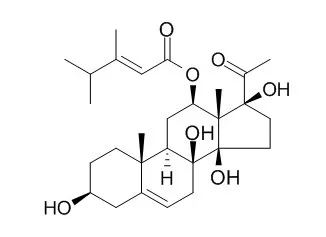| Kinase Assay: |
| Oncol Rep. 2013 Dec;30(6):2923-8. | | Caudatin inhibits human hepatoma cell growth and metastasis through modulation of the Wnt/β-catenin pathway.[Pubmed: 24064800] |
METHODS AND RESULTS:
In the present study, we investigated the antitumor activity of Caudatin in the human hepatoma cell line SMMC‑7721 by analysis of cell viability, cell cycle distribution, apoptosis and metastasis. The results showed that Caudatin impaired the cell viability and inhibited the growth of SMMC-7721 cells in a time- and dose-dependent manner and resulted in cell cycle arrest in the G2 phase. In addition, SMMC-7721 cells, treated with Caudatin exhibited typical characteristics of apoptosis. Furthermore, Caudatin treatment resulted in a decrease in β-catenin and GSK3β in SMMC-7721 cells, with a concomitant reduction in metastatic capability and expression of Wnt signaling pathway targeted genes including cox-2, mmp-2 and mmp-9.
CONCLUSIONS:
Our findings revealed that Caudatin inhibits human hepatoma cell growth and metastasis by targeting the GSK3β/β-catenin pathway and suppressing VEGF production. | | J Cell Biochem. 2012 Nov;113(11):3403-10. | | Caudatin inhibits carcinomic human alveolar basal epithelial cell growth and angiogenesis through modulating GSK3β/β-catenin pathway.[Pubmed: 22678744] |
METHODS AND RESULTS:
In this study, we investigate the anti-cancer activity of Caudatin in carcinomic human alveolar basal epithelial cell line A549 and anti-angiogenic activity in human umbilical vein endothelial cells (HUVECs). We show that Caudatin impairs the cell viability and induces G(0) /G(1) phase arrest in A549 cells with a dose dependent manner. A549 cells, not HUVECs, dealing with Caudatin exhibited typical characteristics of apoptosis, which were accompanied by activation of caspase-3, caspase-9 and Poly(ADP-Ribose) Polymerase (PARP). In addition, Caudatin treatment resulted in a decrease of β-catenin and increase of phosphorylation of β-catenin, and inhibited phosphorylation levels of GSK3β (Ser 9) in A549 cells. Conditional medium of A549 cells-induced or growth factors-induced tube formation of HUVECs was markedly inhibited by Caudatin treatment, which was associated with the inhibiting VEGF secretion from A549 cells by Caudatin.
CONCLUSIONS:
Our findings suggest that Caudatin inhibits carcinomic human alveolar basal epithelial cell growth and angiogenesis by targeting GSK3β/β-catenin pathway and suppressing VEGF production. |
|






 Cell. 2018 Jan 11;172(1-2):249-261.e12. doi: 10.1016/j.cell.2017.12.019.IF=36.216(2019)
Cell. 2018 Jan 11;172(1-2):249-261.e12. doi: 10.1016/j.cell.2017.12.019.IF=36.216(2019) Cell Metab. 2020 Mar 3;31(3):534-548.e5. doi: 10.1016/j.cmet.2020.01.002.IF=22.415(2019)
Cell Metab. 2020 Mar 3;31(3):534-548.e5. doi: 10.1016/j.cmet.2020.01.002.IF=22.415(2019) Mol Cell. 2017 Nov 16;68(4):673-685.e6. doi: 10.1016/j.molcel.2017.10.022.IF=14.548(2019)
Mol Cell. 2017 Nov 16;68(4):673-685.e6. doi: 10.1016/j.molcel.2017.10.022.IF=14.548(2019)